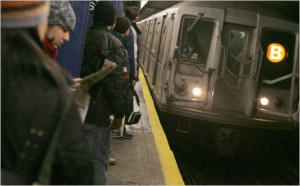
The $104 monthly MetroCard moved one step closer to reality on Wednesday as the Metropolitan Transportation Authority voted to start the process of implementing a sprawling set of fare increases on the region’s buses, trains and bridges.
By Jan. 1, railroad commuters and E-ZPass users who cross the authority’s bridges and tunnels would pay about 10 percent more to get into the city. Almost all bus and subway passengers would shell out more for a ride, and the concept of an unlimited pass to the system may become obsolete.
Officials at the transportation authority say the fare increases will occur in lieu of any additional service cuts this year. But the agency’s financial planners acknowledged that keeping fares down in the future could be contingent on extracting concessions from Transport Workers Union Local 100, a tall order for an agency that has traditionally struggled to rein in labor costs.
The meeting of the authority’s board on Wednesday brought out raw emotions from transit workers and politicians who said the fare increases would be an unfair burden on New Yorkers already facing high unemployment.
But Jay H. Walder, the authority’s chairman, said the fare increases were “forced on us by circumstance.”
“This is not a situation that we’ve created,” Mr. Walder said, moments before the board voted to approve the increases. “It is not a situation that’s occurring because our expenses are up. It’s not a situation that is occurring because our ridership is down. It’s a situation occurring because our subsidies have not been there and money has been taken from us by the state.”
The authority has been floundering financially since last fall, when state legislators voted to strip away some of its money. The economy has also depressed tax revenues and legislators have shown little interest in restoring money for mass transit.
Instead of an across-the-board fare increase, as in years past, the authority will make a variety of smaller tweaks to the myriad ticket types available to its riders.
The fare increases must still go through a public hearing process in September, and a final vote will not be held until October.
Bus and subway riders who use a monthly pass — about a third of all riders — will face one of two possibilities: spending $99 for a monthly pass that would be limited to 90 rides, or paying $104 for an unlimited pass, a 17 percent increase from the current $89 monthly fare. The authority said it would solicit public feedback before deciding between the proposals.
Commuters from Connecticut, Long Island and Westchester County will soon pay up to 9.4 percent more for tickets, depending on the route, and the authority would discontinue the discounts offered for tickets that are purchased online or via postal mail.